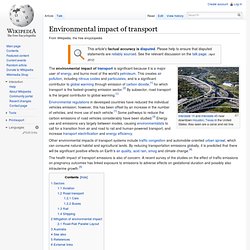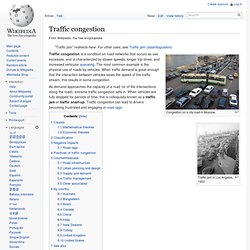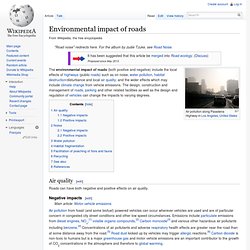

Environmental impact of transport. The environmental impact of transport is significant because it is a major user of energy, and burns most of the world's petroleum.

This creates air pollution, including nitrous oxides and particulates, and is a significant contributor to global warming through emission of carbon dioxide,[1] for which transport is the fastest-growing emission sector.[2] By subsector, road transport is the largest contributor to global warming.[1] Environmental regulations in developed countries have reduced the individual vehicles emission; however, this has been offset by an increase in the number of vehicles, and more use of each vehicle.[1] Some pathways to reduce the carbon emissions of road vehicles considerably have been studied.[3] Energy use and emissions vary largely between modes, causing environmentalists to call for a transition from air and road to rail and human-powered transport, and increase transport electrification and energy efficiency.
Sectors[edit] Traffic congestion. Congestion on a city road in Moscow.

Traffic jam in Los Angeles, 1953 Traffic congestion is a condition on road networks that occurs as use increases, and is characterized by slower speeds, longer trip times, and increased vehicular queueing. The most common example is the physical use of roads by vehicles. When traffic demand is great enough that the interaction between vehicles slows the speed of the traffic stream, this results in some congestion. As demand approaches the capacity of a road (or of the intersections along the road), extreme traffic congestion sets in. Causes[edit] Traffic research still cannot fully predict under which conditions a "traffic jam" (as opposed to heavy, but smoothly flowing traffic) may suddenly occur.
Mathematical theories[edit] Some traffic engineers have attempted to apply the rules of fluid dynamics to traffic flow, likening it to the flow of a fluid in a pipe. Economic theories[edit] Classification[edit] Negative impacts[edit] Viewcontent.cgi?article=1013&context=wollgeo&sei-redir=1&referer=http%3A%2F%2Fwww.google.co.in%2Furl%3Fsa%3Dt%26rct%3Dj%26q%3Denvironment%2520traffic%2520congestion%26source%3Dweb%26cd%3D3%26ved%3D0CDsQFjAC%26url%3Dhttp%253A%252F%252Fro.uow.edu.au%252Fcgi. Congestion. Roads_and_their_major_ecological_effects. 520.full. Environmental impact of roads. The environmental impact of roads (both positive and negative) include the local effects of highways (public roads) such as on noise, water pollution, habitat destruction/disturbance and local air quality; and the wider effects which may include climate change from vehicle emissions.

The design, construction and management of roads, parking and other related facilities as well as the design and regulation of vehicles can change the impacts to varying degrees. Air quality[edit] Roads can have both negative and positive effects on air quality. Negative impacts[edit] Air pollution from fossil (and some biofuel) powered vehicles can occur wherever vehicles are used and are of particular concern in congested city street conditions and other low speed circumstances. Positive impacts[edit] The construction of new roads which divert traffic from built-up areas can deliver improved air quality to the areas relieved of a significant amount of traffic.